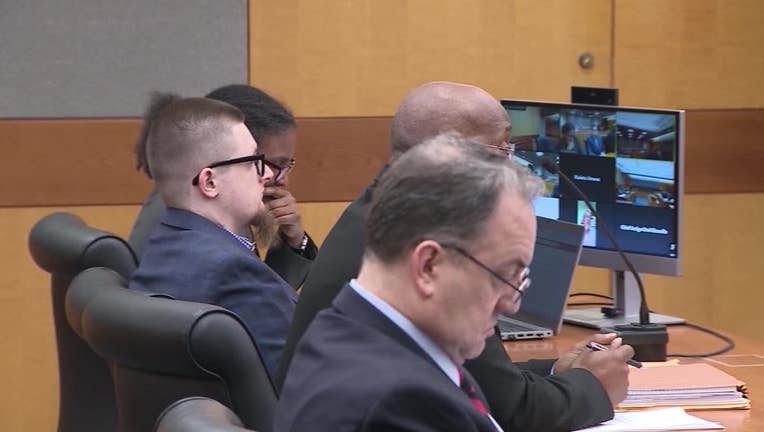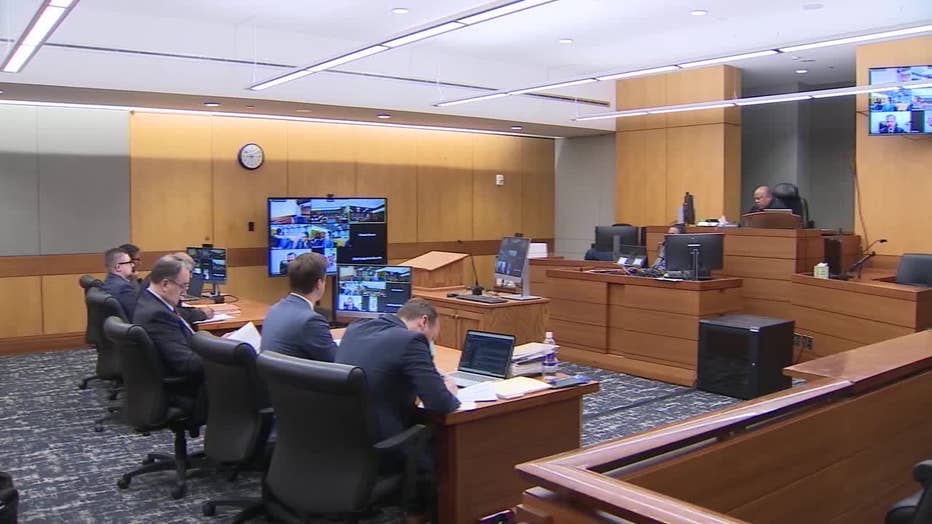Atlanta spa shooting trial: Defense seeks juror sequestration in Robert Aaron Long capitol murder trial

Robert Aaron Long, the man accused of opening fire in multiple Atlanta-area spas in 2021, appears in a Fulton County courtroom on June 3, 2025. (FOX 5)
ATLANTA - Attorneys for Robert Aaron Long, the man convicted in the 2021 Cherokee County spa shootings, have asked a judge to sequester jurors during jury selection in his upcoming capital murder trial in Fulton County.
The backstory:
Long, 25, previously pleaded guilty to killing four people at a spa in Cherokee County and is serving a life sentence without parole. He now faces a separate trial in Fulton County for the murders of four others at two spas in Atlanta on the same day — March 16, 2021.
Long is accused of carrying out a deadly rampage at three spas in Fulton and Cherokee counties. Prosecutors say he admitted to investigators that he was intoxicated and went to the massage parlors because of what he described as a sex addiction. He told authorities he had planned to kill himself afterward.
Six of the eight victims in the shootings were of Asian descent, prompting national outrage and renewed conversations about anti-Asian violence.
Timeline:
Here is how the case has unfolded:
March 16, 2021
Robert Aaron Long, 21, carried out a shooting spree at three metro Atlanta spas. He first attacked Youngs Asian Massage in Cherokee County, killing four people: Xiaojie "Emily" Tan, 49; Daoyou Feng, 44; Delaina Ashley Yaun, 33; and Paul Andre Michels, 54. A fifth victim, Elcias R. Hernandez-Ortiz, was injured. Long then drove to Atlanta, where he fatally shot three women—Suncha Kim, 69; Soon Chung Park, 74; and Hyun Jung Grant, 51—at Gold Spa, and killed Yong Ae Yue, 63, at Aromatherapy Spa across the street.
March 16, 2021
Long was apprehended in Crisp County, approximately 150 miles south of Atlanta. His parents had recognized him from surveillance footage and alerted authorities, who used a vehicle tracking device to locate him.
March 17, 2021
Authorities charged Long with eight counts of murder and one count of aggravated assault. He confessed to the killings, claiming they were motivated by a sex addiction, not racial bias. This assertion was met with widespread skepticism, as six of the eight victims were women of Asian descent.
May 11, 2021
A Fulton County grand jury indicted Long on 19 counts, including murder, aggravated assault, and domestic terrorism. District Attorney Fani Willis announced plans to seek the death penalty and pursue hate crime enhancements based on race and gender.
July 27, 2021
Long pleaded guilty in Cherokee County to four counts of murder and other charges. He received four consecutive life sentences without the possibility of parole. Prosecutors stated there was no evidence of racial bias in the Cherokee County shootings.
August 30, 2021
Fulton County prosecutors formally filed notice to seek the death penalty against Long and designated the Atlanta shootings as hate crimes.
September 28, 2021
Long pleaded not guilty to the Fulton County charges, which include murder, aggravated assault, and domestic terrorism.
March 2025
A Fulton County judge ruled that statements Long made to investigators after his arrest, as well as those from his Cherokee County guilty plea, could be used in his upcoming trial. Defense attorneys had argued that his rights were violated during questioning.
April 2025
Pretrial hearings continued in Fulton County. No trial date has been set. Prosecutors maintain their intent to seek the death penalty and hate crime enhancements.
March 16, 2025
The fourth anniversary of the shootings was commemorated with events honoring the victims and raising awareness about anti-Asian violence. Community members gathered to reflect on the tragedy and advocate for justice.
What we know:
Attorneys for Robert Aaron Long, the man facing the death penalty for a series of spa shootings in Atlanta, filed multiple motions this week in Fulton County Superior Court seeking sweeping changes to the jury selection process in his upcoming capital trial.
In a court filing, defense attorneys asked that jurors who have been questioned be kept separate from those who have not. They argue that the request is necessary to "ensure a fair and impartial jury." They also request to individually question and sequester prospective jurors, provide daily transcripts of the voir dire proceedings, prohibit the use of certain preliminary juror qualification questions, and prevent the disqualification of jurors opposed to the death penalty.
"The enormous pretrial publicity surrounding this case, and coverage of inadmissible and inflammatory allegations, clearly presents a situation in which individual voir dire is required during jury selection to assure Mr. Long’s rights to a fair trial by an impartial jury," the motion states.

Robert Aaron Long, the man accused of opening fire in multiple Atlanta-area spas in 2021, appears in a Fulton County courtroom on June 3, 2025. (FOX 5)
In Motion No. 50, Long’s defense team argues that the court must permit individual and sequestered voir dire due to the extensive pretrial publicity surrounding the case. Attorneys Jerilyn Bell and Christian Lamar, representing the Georgia Capital Defender’s Office, say a failure to question potential jurors individually could lead to biased outcomes.
"The enormous pretrial publicity surrounding this case, and coverage of inadmissible and inflammatory allegations, clearly presents a situation in which individual voir dire is required during jury selection to assure Mr. Long’s rights to a fair trial by an impartial jury," the motion states.
In Motion No. 52, the defense requests that the court provide a daily transcript of all voir dire proceedings, arguing that it is essential for ensuring the ability to respond to any improper use of peremptory strikes by prosecutors. The motion cites the necessity of a written record to challenge any race- or gender-based strikes under Batson v. Kentucky and J.E.B. v. Alabama.
Defense counsel also filed Motion No. 53, asking the court to bar use of the four standard juror qualification questions laid out in Georgia law. They argue the questions are "conclusory" and "suggestive of the proper answer," rendering them ineffective in identifying juror bias.
In a fourth motion, Motion No. 51, Long’s attorneys challenge the constitutionality of the practice of "death-qualifying" juries—excluding jurors who are unwilling to impose the death penalty. The defense claims this creates juries that are more likely to convict and less representative of the community.
"Empirical research has demonstrated that the systemic exclusion of jurors who have a moral objection to the death penalty results in capital juries that tend to be more conviction prone, more death prone and more biased against mitigation," the motion states.
The defense argues that death qualification disproportionately excludes Black jurors and women, referencing testimony from Dr. Wanda Foglia of the Capital Jury Project and research showing that jurors more inclined to support the death penalty are also more likely to favor conviction.
The motions collectively assert that without the requested reforms, Long would be deprived of his constitutional rights to a fair trial, an impartial jury, and due process, guaranteed under both the Georgia and United States constitutions.
Attorneys met for a status hearing on Tuesday where the defense introduced multiple motions.
Another motion deals with the capitol murder charge and the death penalty.
What we don't know:
It is not clear what and when Fulton County Superior Court Judge Ural Glanville will rule on the motions.
SEE ALSO:
- Community remembers victims of Atlanta spa shootings 4 years later
- Georgia lawmakers to honor Fulton County victims of 2021 spa shootings today
- Atlanta spa shooter appears in Fulton County courtroom
- Atlanta spa shootings victims remembered 3 years later
- Man accused in Atlanta spa shooting appears in Fulton County court for hearing
The Source: The details in this article come from the Fulton County Superior Court.

